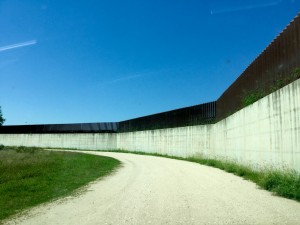By Christine Thurlow Brenner
Department of Public Policy and Public Affairs
The oft quoted line from Robert Frost’s poem, “Mending Wall,” “good fences make good neighbors” belies the message the poet intended. It is actually his neighbor’s repetitive learned-from-birth isolationist rationale for keeping the wall between them.
Frost’s heart felt perspective on walls, “Something there is that doesn’t love a wall,” is actually captured in the opening line. And later when he repeats while pondering,
“Before I built a wall I’d ask to know
What I was walling in or walling out,
And to whom I was like to give offence.
Something there is that doesn’t love a wall,”
The Republican candidate’s much trumpeted statement is “There must be a wall across the southern border.” A wall that he believes Mexico, or immigrants themselves, will pay for has been a consistent theme throughout the election campaign. Mexican President Enrique Peña Nieto disabused that notion during Trump’s recent visit.
Recent analysis from the Pew Research Center, based on the 2014 American Community Survey data, indicates that the “overall number of U.S. unauthorized immigrants holds steady since 2009.” Seven states realized statistically significant decreases in unauthorized immigrants, including immigrant magnet states of California, Nevada, Illinois, Georgia, and South Carolina.
Only six states saw a statistically significant increase in authorized immigration. Mexican newcomers represented the largest percentage by country of birth in four of the six states. How does a southern wall prevent unauthorized entry from India or China, two of the other leading countries of birth for three of the states? While migrants from the northern triangle countries of Honduras, Guatemala and El Salvador may end up trekking through Mexico to gain entry, it seems a much less likely route for Brazilians.
Trump estimates it will cost $8 billion to extend the southern border wall beyond the 650 miles of fencing that already exist. Eminent domain proceedings and just compensation for property owners, design specifications, materials, labor and time for construction. The cost to border communities of separated physical environments on flora and fauna, water, families, and indigenous persons is probably not part of that calculation.
The wall is about bullying and belittling persons who do not fit neatly into candidate Trump’s view of who should be in America. His own family pretended to be Swedish when they first emigrated to the United States for fear of being labeled German in the post-war period where that othering might have compromised their own future. (See Trump’s The Art of the Deal, 1987).
A wall is not a solution. It is a provocation. It is Putinesque bare-chested braggadocio from a candidate who does not care to understand the importance of innovation, entrepreneurship, and revitalization that immigrants represent for the American 21st Century. The U.S. Small Business Association’s 2012 study of immigrant entrepreneurs found immigrants have higher business ownership and formation rates than non-immigrants (1 out of 10 owns a business). The pro-business Kaufman Foundation reports that forty-four percent of the engineering and technology sector firms founded in Silicon Valley between 2006 and 2012 had at least one highly-educated founder who was born abroad. Immigrants represent most of the urban growth in northern rust-belt cities like Detroit, Baltimore, St. Louis and Pittsburgh, according to the Fiscal Policy Institute. Immigrants now, as in the past, make America great.
Rather than wait for some future American global humiliation à la President Reagan’s 1987 Mr. Gorbachev-tear-down–that-wall moment, an acknowledgment that Frost was right is needed. “Something there is that does not love a wall.”
 Christine Thurlow Brenner (PhD, University of Texas at Arlington) is associate professor and chair of the Department of Public Policy and Public Affairs at UMass Boston’s McCormack Graduate School. Her research expertise is in immigration policy, urban affairs, and public budgeting and her work has appeared in several publications including Administration and Society, Journal of Public Management and Social Policy, and International Journal of Economic Development.
Christine Thurlow Brenner (PhD, University of Texas at Arlington) is associate professor and chair of the Department of Public Policy and Public Affairs at UMass Boston’s McCormack Graduate School. Her research expertise is in immigration policy, urban affairs, and public budgeting and her work has appeared in several publications including Administration and Society, Journal of Public Management and Social Policy, and International Journal of Economic Development.
Photo credit: Photo via Wikimedia Commons: http://bit.ly/2d8ADJF (CC BY-SA 3.0 us)

